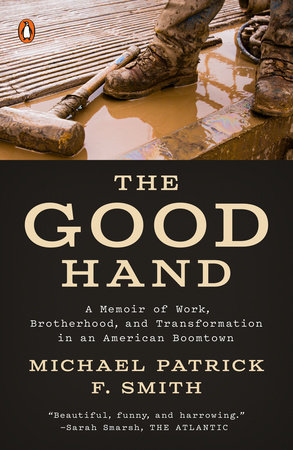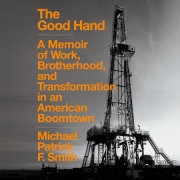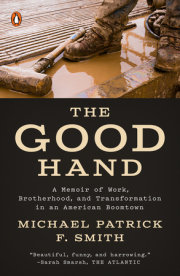Raising the Derrick
Like most people who rely on oil for nearly every aspect of their existence, I didn't know anything about a drilling rig. I pulled off my hard hat, wiped my forehead with my forearm, and looked across the work location, trying to take it all in. On a mud-colored scar in the land cut flat two hundred yards across, trucks coughed diesel, cranes farted smoke, and dust turned to mud on the faces of men toiling under bright sunlight. The rig was half in pieces-giant square chunks of steel, littered across the dirt. I had no idea how it went back together. I adjusted the inside strap of my hard hat-what had the roughneck called it? A "brain bucket?"-and set it back on my head. It was my fifth day in the oil patch. I had yet to make a hand; I didn't even know what it meant to "make a hand," and I had no idea how vital that idea would become to me. I was a greenhorn, what most oil patch guys call a "worm," a headless, legless, brainless thing, good for eating dirt and shutting the fuck up.
I had just left the shit box. The plumbing wasn't functional yet, so the bathroom consisted of a trailer with a bare lightbulb, a toilet, and a mess of flies. It was 99 degrees outside the trailer and probably 120 degrees inside the shit box. Standing twenty feet away from it, I could smell the stink carried on the breeze.
In five days of work, I'd clocked over seventy hours of heavy manual labor. My neck and shoulders were stiff, my arms, legs, knees, and ankles battered and sore. My hands ached, and my head felt foggy from lack of sleep. Over the past several weeks, I had been crashing on a filthy flophouse floor, in a room I shared with several other migrant workers. The stress of the oil field work, combined with the stress of this living situation, aggravated a twitch under my left eye. It felt like my face was shorting out.
That morning, I'd made the mistake of thinking about giving up. The thought had wormed its way into my brain, and now I couldn't seem to shake it. I was bone-tired, afraid, and nauseous.
There were many ways to get hurt on location. Or die. Exhausted men operated heavy machinery, trucks thundered past, heavy objects flew through the air-steel swinging steel around on cables, hooks, and slings. You could go blind. You could lose your hearing. You could lose a limb. A rod could snap, and bam: instant lobotomy. One hundred thirty-eight oil field hands had been killed in the United States the previous year. I looked around. I could see it happening to me. My breathing sped up, and my stomach knotted. I tried to take slow steady breaths.
Dragonflies buzzed around. I walked through a row of pickup trucks, across the dirt patch and toward a pile of wind walls-thin metal sheets some fifteen feet across. A wind wall does exactly what it sounds like it should do. On the high plains, with no trees or mountains to stop it, the wind is fierce. Even in the summer, gusts of northern air can all but knock you down. The walls protect against that. They make it easier for men to work the floor of the drilling rig, two to three stories above the dirt.
I was twenty yards from the crane and maybe thirty yards from the base of the rig. I squinted up into the sun. A wind wall, attached to the crane by four metal chains on the crane's whip line, dangled in the air above the rig's floor. A crew of roughnecks, strapped into harnesses and wearing heavy work boots, guided the wall down, set it carefully in place, and, after lumbering along the edge of the floor, swung their sledgehammers at large metal pins to attach it to the rig.
When the wall was connected, the crane operator reeled in the whip line. It swung in an arc above the men, away from them and toward me. With the precision of a bullet hitting a bull's-eye, the chains came to a sharp stop directly in front of me, the hooks suspended at the level of my chest. I gathered them into my hands, sliding the fasteners into eye hooks welded onto the corners of the next wall, then I looked back to the operator. He sat in the cab, blue Oakley sunglasses and beard slapped across an inscrutable expression. I waved a hand, and he gave me a nod. I stepped away from the pile, and another wind wall flew up into the blue.
At lunchtime, I sat in the back of the work van and ate cold Chunky soup out of the can. Bobby Lee sat with the driver's seat kicked way back, his boots up on the dash. He wore a Resistol brand Diamond Horseshoe cowboy hat pulled low over his eyes. At one point the hat had been the color of pearl, but it was beat to shit, dirty, greasy, and floppy-incongruent with his studied look. "Now you know why gas is so expensive," Bobby Lee said.
I stared out the window of the van. The work site was cluttered with tractor trailers, pickup trucks, forklifts, a hydraulic crane, a lattice boom crane, rows of stacked piping, giant metal structures, and crews of men.
No one was even drilling for oil yet. Everything I saw out the window-the trucks, the cranes, the men-was there because a previous well had been drilled to completion. And so we had shown up, Diamondback Trucking, to take the rig-the mechanism that extracts oil from the well-apart and load it onto haul trucks to bring it here, to a new location, where it was being reassembled over a new drill hole.
The previous day, Bobby Lee had handed me a sheet of paper to sign. In the mornings, we had safety meetings. We stood around with the roughnecks; somebody talked over the day's plans, and we all signed a paper. I had never read the paper, but when Bobby handed me this page I thought it looked like all the others.
"Didn't I sign this already?" I asked him.
"It's a new one," Bobby said.
"Okay," I said, putting my name across it.
"And when I hand you something," Bobby continued quietly, "don't ask any questions. Just fucking sign it. And smile."
He watched me silently until I faked a smile.
"And like it," he told me. Then he breezed away.
Bobby Lee was like that. When a roughneck rushed up to him hollering about a problem, he raised his hand slowly, palm down, to eye level.
"Do you see my hand?" Bobby asked.
"Uh, yeah."
"It's not shaking," he said.
That same day, a crane operator asked Bobby if he should get started on something.
"Did I tell you to start something?" Bobby spoke so quietly that he forced the crane operator to lean in.
"No," the operator replied.
"Do your job," said Bobby. He lit a cigarette, and then he walked off. The crane operator sat back in his seat and spit dip into an empty soda bottle.
Bobby Lee looked like Don Johnson. He wore blue jeans, cowboy boots, and a Western-cut blue denim shirt with a pack of USA Gold cigarettes in each breast pocket. He stood out, because on location everybody else looked the same. Faces hidden behind shaded safety glasses, heads covered by hard hats, the men wore fire-resistant jumpsuits with metallic stripes down the sides. They smoked, chewed dip, or spit sunflower seeds. They wore the same goatees, mustaches, or beards, dirt on their faces and dust in their teeth. They sweat and they cursed, and when they saw my green hard hat-I was a literal greenhorn-they identified me as a dumb fuck. But I couldn't tell any of them apart. Throughout the day, they appeared in bright sunlight in front of me, shouted a few words, and then disappeared back into the dust.
"I just started last week," a fellow greenhorn yelled at me over the din of a truck. "They don't tell you how to do anything. I don't know why. They'd save a lot of time if they told you."
"Don't stand there. Hand me that hook," a truck driver hollered at me. I handed him the hook, and he turned his back to me completely. I stood there for some time staring at his back. Then, unsure of myself, I walked off.
One guy told me to watch out for the crane operator I was working with. "He'll hurt you," he said solemnly.
"Can I throw this chain to you?" a dude asked.
"Yeah," I said.
"You ready?"
"Yeah," I said.
"You ain't ready," he said, and he threw the chain at me.
I thought of what the Safety Man had told me: "You're gonna be able to tell your grandkids you moved rigs across the Bakken Formation at the height of the North Dakota oil boom." I thought about how much money I was going to make.
On my first day, I had teamed up with another field hand, a young, muscular guy with braces. We rigged a twenty-foot-tall steel structure, called a derrick stand, to a gin truck. For the sake of simplicity, I'll just say right now that a gin truck is a big truck with a small crane on the back. It acts somewhat like a tow truck. We wrapped the chains from the gin truck around the steel structure and stepped away from it.
The driver pulled away, dragging the thing behind him. I followed.
"Don't stand under that derrick stand," the driver yelled at me through his window. "That's a dumb fucking obvious thing you shouldn't do. If it tipped you wouldn't get out from under it. How long you work here?"
"Today," I yelled back to him.
"Well, don't stand under the fucking stand."
I stepped away. The gin truck driver, a white-haired oldster with a handlebar mustache and a cranky voice, later approached me. "You started today? Well, I'll tell you when you do some dumb fucking shit you obviously shouldn't do."
"Please do," I said.
"I will. I'll let you know when you do dumb fucking obvious shit."
"Thank you," I said.
"You don't want to see that?" It was Bobby Lee again. Lunchtime, and I'd fallen asleep in the van. I blinked my eyes open, wiped a string of drool from my mouth, and looked out the window. The company hands were raising the derrick.
I climbed out of the van and stood beside it in the dust. The derrick is the tower that supports the network of pipe that is inserted into the earth for drilling. It gives a rig its height and makes a drilling rig look like a drilling rig. In the process of putting a rig together, the derrick is assembled horizontally, then hinged to the drilling floor, and raised on that hinge by braided steel cables spooled around a steel drum called the draw works. When erect, the derrick, like the mast of a ship (it is sometimes called a mast), sits atop the rig, directly above the drill hole, or well. The derrick on this particular rig, Sidewinder Canebrake 103, when completely raised, would stand over 160 feet in the air.
I watched the derrick pivot slowly upward. Behind it hung a vast swath of perfect blue sky. I took out my phone and recorded a video. I was bearing witness to the beginning of a process in which men would wrestle oil, one of the modern age's most precious materials, from shale deposits buried deep in the earth.
Oil was once thought to have mystical properties. In western Pennsylvania, the cradle of American oil exploration and production, Native American shamans from the Seneca tribe used the strange black substance in ritualistic healing exercises. They also used it to cauterize wounds and seal canoes. White men caught on, mixing what they called rock oil with liquor and selling the drink as a cure-all. The snake oil salesman was born.
In 1859, in the town of Titusville, Pennsylvania, near the home of the Seneca, a self-titled "Colonel" Edwin Drake drilled the world's first working oil well. Refined into kerosene, oil came to replace whale fat as the world's primary illuminant. Kerosene became "the light of the age." It literally made the day longer. And it made money. Oil was dubbed "black gold." A rush began. Oil City grew out of the muddy banks of Oil Creek, and the planet experienced its first oil boom.
It is strange to think of industry containing magic, but even in our current age of reason, it is hard not to think of oil as containing properties that, although also destructive, can only be described as utterly fantastic. Oil, refined into gasoline, diesel, and jet fuel, makes cars drive, planes fly, and ships sail. It powers submarines and spacecraft, sends shellfish to Colorado, medicine to Liberia, and soldiers and supplies to war zones around the world. It powers our school buses and gunships, ambulances and tanks. But it does more than transport us. It heats our homes. It illuminates our nights. We eat off it. Petroleum is contained in the glaze on our china, the finish on our tables, the linoleum on our counters, the tile on our floors. It wraps around us in the fabric that clothes our naked bodies, in the jewelry that adorns our necks and hands and fingers, in the balm that soothes our cracked lips, in the makeup that defines the contours of our faces. And it is inside of us. The syringes and the pills that deliver medicine into our systems are made from petroleum. Synthetic ammonia, derived from a process using refined oil, is an essential ingredient in fertilizer. Without it, farming on an industrial scale would not be possible. It is in our food. We eat it. Oil is so prevalent in every aspect of our existence that it has become all but invisible to the vast majority of people who need it simply to live.
And the people whose job it is to extract it from the earth? A group of them approached me. Dirty faces, goatees, and dark safety glasses.
"You ever been turtle fucked?" one of them asked. I braced myself.
"No," I said.
They shrugged and laughed and kept walking.
"Why don't you show him?" one asked.
I stood in the dirt and watched them move away from me. A rush of wind tore across the work site, peeling up a layer of dust and pushing it through the greasy machines, where it dissipated in reams of waving western wheat grass. My body was coiled tight, blood pounding through my brain. I took a deep breath, let the air fill my lungs and loosen my limbs. I spit on the ground and got back to work.
Copyright © 2021 by Michael Patrick F. Smith. All rights reserved. No part of this excerpt may be reproduced or reprinted without permission in writing from the publisher.







